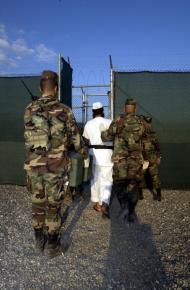Democrats look the other way
looks at how the Democrats have worked to prevent those who committed and authorized torture under Bush from ever being prosecuted.
THE STUBBORN refusal of the Democrats in both Congress and the White House to deliver on their promise to hold the Bush administration responsible for torture offers a sobering reminder of the party's ability to hide conservative politics behind liberal rhetoric.
Public opinion has been demanding answers on this issue for more than five years now. In August, Attorney General Eric Holder announced that the Obama administration's latest concession to this public pressure would be an independent review into specific interrogations conducted by the CIA.
While the mainstream media may have wanted to ignore all this, public sentiment has forced it to keep the issue alive. Much of the credit for this goes to individuals and people working with groups like the ACLU, the Center for Constitutional Rights, Human Rights Watch and Amnesty International, which kept a spotlight on the issue of torture and the U.S. prison camp at Guantánamo Bay. Likewise, investigative journalist Seymour Hersh's articles detailing abuses at Abu Ghraib and other revelations have added to the public questioning.

According to a USA Today/Gallup poll earlier this year, 62 percent of the population wants an investigation into "the possible use of torture while interrogating terrorism suspects" (38 percent wanted a criminal investigation by the Justice Department, while 24 percent wanted an independent panel that would investigate, but not necessarily prosecute).
BOTH DURING and immediately after the 2008 election campaign, Barack Obama and other Democrats acknowledged this public pressure. Vice President Joe Biden assured reporters in September 2008 that "we will not be stopped from pursuing any criminal offence that's occurred," and among Obama's first acts as president was to sign executive orders mandating the closure of the Guantánamo prison by the end of January 2010 and the termination of all "aggressive" interrogation techniques pending a review by an inter-agency task force.
But Obama and the Democrats stopped short of initiating an independent investigation into the criminality of the Bush administration's detention and interrogation policies. So far, they have managed to stall the issue--and in the meantime, undermine their earlier actions.
While the prisons in Guantánamo may still close by the end of January, the Obama administration has decided to subject 20 prisoners to what Obama himself previously described as a "flawed military commission system." And it will continue the practice of "extraordinary rendition"--meaning that both prisoners being held now and any future prisoners can be handed over to other countries, such as Egypt, Syria or Pakistan, where torture isn't against the law.
Obama himself has actively opposed investigations into the Bush administration's crimes, insisting that we "look forward, not back."
On April 16, he prefaced the release of a series of Bush administration memos justifying torture with assurances that the CIA agents who used abusive interrogation techniques on prisoners "carried out their duties relying in good faith upon legal advice from the Department of Justice," he said in a statement--and that "they will not be subject to prosecution."
On May 13, when he reversed his decision to release a series of photographs showing U.S. personnel abusing prisoners, Obama said the photos would "further inflame anti-American opinion" and "put our troops in danger."
This August, Holder reiterated Obama's position on "good faith" torture and the call to "look forward" with his statement regarding an independent review of certain CIA interrogations.
Congressional Democrats have also tried to ignore the public demand for accountability--either by "passing the buck" to the White House, or by openly echoing the rhetoric of their Republican colleagues that closing Guantánamo would allow violent and dangerous terrorists to be transported to "U.S. soil," exposing the public to reprisals. The self-proclaimed "blue dog" Democrats in the Senate, led by Evan Bayh of Indiana, have worked especially hard to stall legislation that would fund and provide logistical support for the administration's Guantánamo plan.
For its part, the mainstream media have repeated the wild claims about dangerous terrorists on American soil with a straight face, while ignoring the efforts of Amnesty International and other international human rights organizations to push Congress to mandate an independent investigative panel.
This combination of scaremongering and conservative political pressure appears to have succeeded in turning a majority of public opinion against bringing political prisoners into the United States, although it doesn't seem to have eroded the widespread support for closing down the prisons in Cuba.
The Democrats' foot-dragging on such relatively moderate measures as a comprehensive inquiry into the use of torture and closing down Guantánamo has kept the bigger questions out of the debate entirely. Civil and human rights groups are effectively asking for little more than a return to pre-September 11 detention and interrogation policies.
While this seems to be more than the political establishment is willing to tolerate, it shouldn't be forgotten that many of the practices that have outraged public opinion predate the "war on terror"--for example, the use of "extraordinary renditions" actually began under the Clinton administration. Traditional abuses of secrecy and authority that pre-date the Bush era may be responsible in part for the Democrats' reluctance to address these issues.
Torture and illegal detention don't exist in isolation from other civil rights issues, nor are they ever implemented independently of the ruling class' economic or political agenda. Recognizing this broader context is important in spreading the discussion into the realm of immigrant rights and other anti-racist issues, and in bringing protest on this question into a broader realm of activism and social justice.


